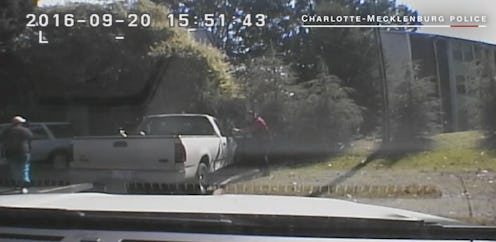News
Did Keith Lamont Scott Have A Gun?

Video released Saturday by Charlotte police of the officer-involved shooting of a black man in Charlotte, North Carolina, has done little to clear up critical questions surrounding his death. One of the more critical points of contention in the case is whether or not Keith Lamont Scott had a gun when officers from the Charlotte-Mecklenburg Police Department (CMPD) engaged him outside the Village at College Downs apartment complex on Sept. 20. Neither the dashcam, body-cam, or cell phone footage released so far shows whether Scott was holding a gun when he was fatally shot by police. Furthermore, perhaps, given North Carolina's gun laws, the issue is slightly more complex than whether or not Scott had a gun.
There's no clear consensus on whether or not Scott was armed when CMPD engaged him as he sat in a vehicle outside an apartment complex. His family maintains that he was unarmed at the time of his death and had been merely sitting in his vehicle reading a book while waiting for his son. A spokeswoman for the CMPD, however, said Saturday that a lab analysis had revealed the presence of Scott's DNA and fingerprints on a loaded handgun recovered from the scene by investigators. In an earlier statement released Sept. 20, police claimed Scott had "got back out of the vehicle armed with a firearm and posed an imminent deadly threat to the officers who subsequently fired their weapon striking the subject."
Video footage released by both Scott's family and the CMPD have failed to clearly answer the question of whether or not he was armed or threatening police. In some ways, it's only increased speculation about the incident as some, including MSNBC, have questioned whether a segment of the footage in which an officer allegedly appears to toss something dark on the ground near Scott's body is evidence police could have planted a weapon. Bustle has reached out to the CMPD for comment on that claim.
It's important to note that it's legal to open-carry a handgun in North Carolina. Furthermore, concealed-carry is also legal with a permit. So while many are wondering if Scott had a gun, perhaps a better question is was that reason enough for police to engage Scott in the first place? According to the Charlotte Observer, a 2013 ruling by the Fourth Circuit Court of Appeals declared that police cannot stop and search someone solely on the grounds they're carrying a handgun.
Police expanded on their initial report in a statement released Sept. 24 that said two officers on hand to serve an outstanding warrant to an unrelated individual observed Scott in possession of marijuana and later a handgun. "[The] officers did not consider Mr. Scott's drug activity to be a priority at the time and they resumed the warrant operation," a statement from a CMPD said. "A short time later, Officer Vinson observed Mr. Scott hold a gun up. Because of that, the officers had probable cause to arrest him for the drug violation and to further investigate Mr. Scott being in possession of the gun."